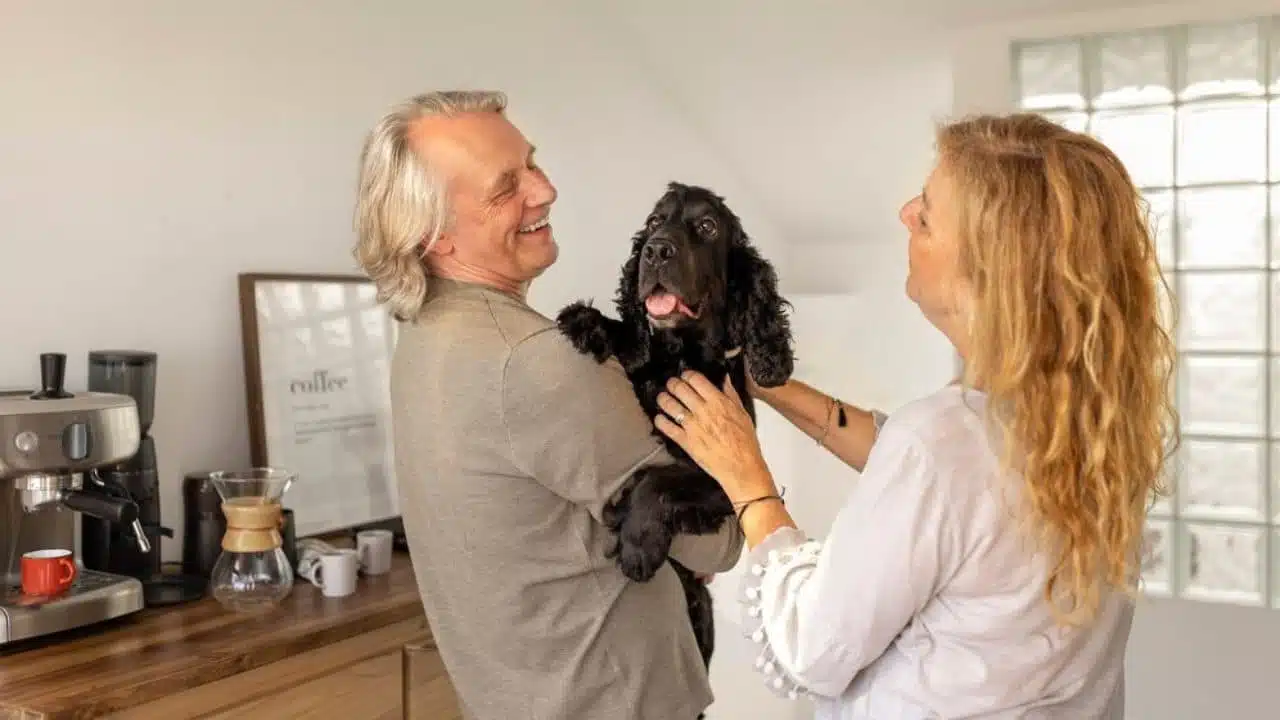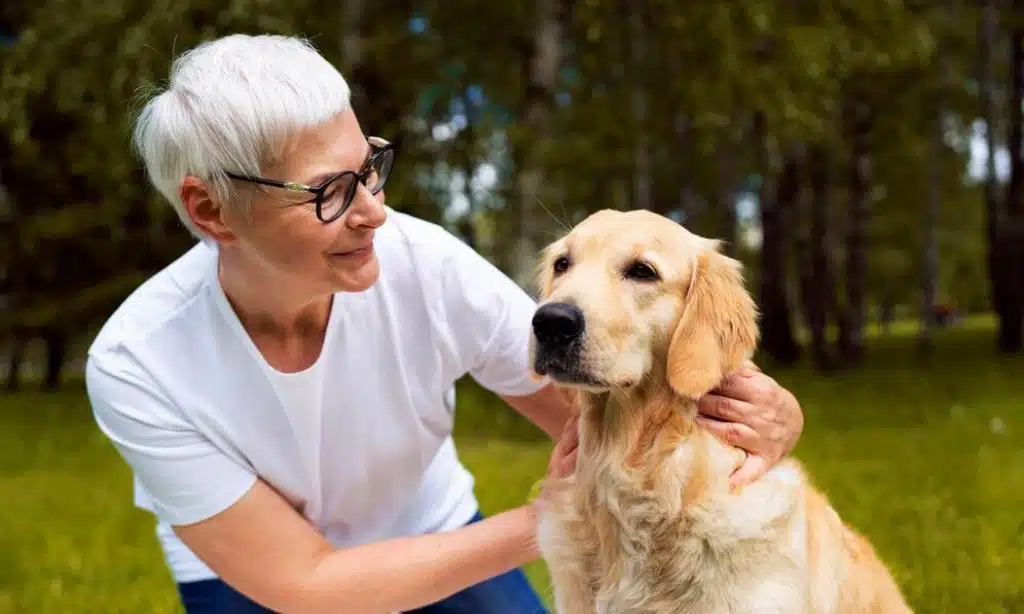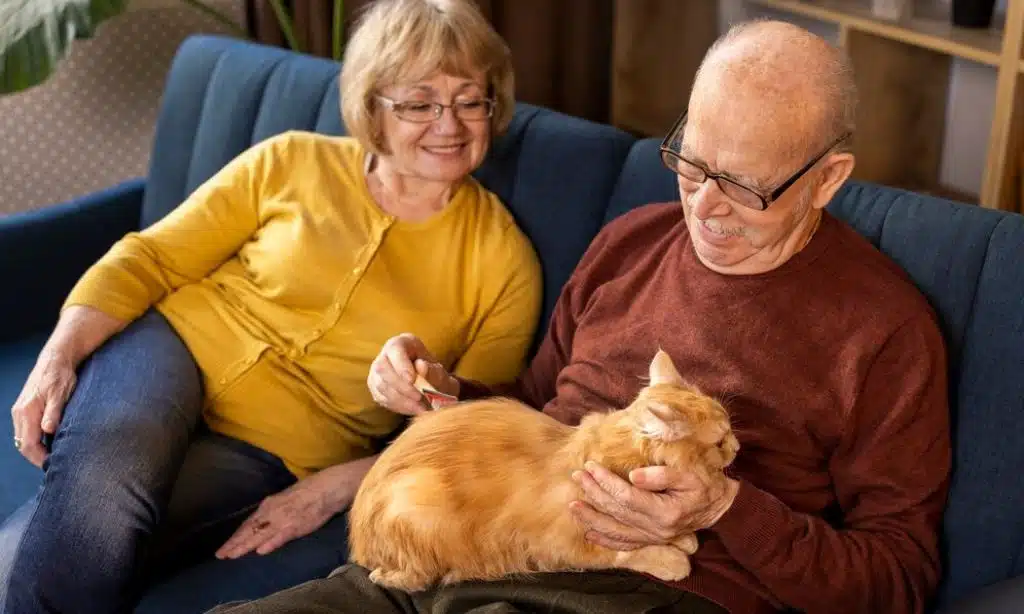Our pets are more than just animals; they’re cherished members of our families. We watch them grow from playful puppies and kittens into loyal adult companions. Before we know it, they’ve entered their golden years.
Just like humans, pets face unique challenges as they age. But with the proper care and attention, we can help our senior pets live comfortable, happy lives well into their twilight years.
In this comprehensive guide, we’ll explore the world of senior pet care. We’ll look at how to recognize the signs of aging, address common health concerns, and make lifestyle adjustments to ensure your aging pet’s well-being.
From nutrition and exercise to mental stimulation and regular vet check-ups, we’ll cover all aspects of senior pet care. We’ll also discuss creating a comfortable environment for your aging pet and handling end-of-life considerations with compassion and dignity.
Let’s embark on this journey together to give our senior pets the love and care they deserve in their golden years.
Understanding Senior Pets
Before we dive into specific care tips, it’s essential to understand what qualifies a pet as “senior” and how aging affects our furry friends.
When is a Pet Considered Senior?
The age at which a pet is considered senior can vary depending on the species, breed, and size. Here’s a general guideline:
- Cats: Most cats are considered senior between 7-10 years old.
- Small Dogs (under 20 pounds): Usually considered seniors around 7-10 years old.
- Medium Dogs (20-50 pounds): Often reach senior status between 7-9 years old.
- Large Dogs (50-90 pounds): May be considered senior as early as 6-8 years old.
- Giant Dogs (over 90 pounds): Often reach senior status at 5-7 years old.
Remember, these are just guidelines. Some pets may show signs of aging earlier or later than these ranges suggest.
How Aging Affects Pets
As pets age, they experience various physical and mental changes. Some common effects of aging in pets include:
- Decreased energy levels
- Changes in sleep patterns
- Reduced mobility and flexibility
- Weakened immune system
- Dental issues
- Vision and hearing loss
- Cognitive decline
- Changes in appetite and weight
- Increased susceptibility to certain diseases
Understanding these changes can help you provide better care for your aging pet and recognize when they might need extra attention or medical care.
1. Regular Veterinary Care
One of the most crucial aspects of senior pet care is regular veterinary check-ups. As pets age, their health needs change, and they become more susceptible to various conditions.
Frequency of Vet Visits
While adult pets typically need annual check-ups, senior pets benefit from more frequent visits. Most veterinarians recommend bi-annual check-ups for senior pets. These regular visits allow for the following:
- Early detection of health issues
- Monitoring of existing conditions
- Adjustments to medication or care plans
- Preventive care measures
Importance of Health Screenings
During these check-ups, your vet may recommend various health screenings. These can include:
- Blood tests to check organ function and detect diseases
- Urinalysis to assess kidney function and check for urinary tract infections
- Blood pressure measurements
- Thyroid function tests
- X-rays or ultrasounds to check for internal issues
These screenings can help detect problems early when they are more treatable and manageable.
Dental Care
Dental health is essential for senior pets. Regular dental check-ups and cleanings can prevent painful dental diseases and help maintain your pet’s overall health. Your vet can advise on your senior pet’s best dental care routine.
2. Nutrition for Senior Pets
As pets age, their nutritional needs change. Proper nutrition can help manage weight, support joint health, and even slow the progression of certain age-related conditions.
Adjusting Diet for Senior Pets
Senior pets often benefit from diets that are:
- Lower in calories to prevent obesity
- Higher in fiber to aid digestion
- Rich in high-quality proteins to maintain muscle mass
- Supplemented with omega-3 fatty acids for joint and cognitive health
However, it’s important to note that there’s no one-size-fits-all senior pet diet. The best diet for your pet will depend on their health needs, which your vet can help determine.
Dealing with Changes in Appetite
Some senior pets may experience changes in appetite. They might eat less due to decreased activity levels or dental issues. Others might seem hungrier due to medications or certain health conditions. If you notice significant changes in your pet’s appetite, consult your vet.
Importance of Hydration
Proper hydration becomes even more critical as pets age. Senior pets may be more prone to dehydration due to kidney issues or medications. Ensure your pet always has access to fresh, clean water. For cats, consider using water fountains to encourage drinking.
3. Exercise and Physical Activity
While senior pets may not have the same energy levels as they did in their youth, regular exercise remains crucial for their physical and mental well-being.
Benefits of Regular Exercise
Regular physical activity for senior pets can:
- Help maintain a healthy weight
- Keep joints flexible
- Maintain muscle mass
- Promote good circulation
- Provide mental stimulation
- Support digestive health
Adjusting Exercise Routines
As pets age, their exercise needs and abilities change. Here are some tips for exercising senior pets:
- Opt for shorter, more frequent exercise sessions
- Choose low-impact activities like walking or swimming
- Allow for plenty of rest between activities
- Be mindful of weather conditions – extreme heat or cold can be more brutal on senior pets
- Watch for signs of fatigue or discomfort
Physical Therapy and Alternative Treatments
For senior pets with mobility issues, physical therapy can be beneficial. Hydrotherapy, massage, and acupuncture can help manage pain and improve mobility. Always consult your vet before starting any new exercise routine or alternative therapy.
4. Creating a Comfortable Environment
As pets age, they may need some changes to their environment to stay comfortable and safe.
Making Your Home Senior-Pet Friendly
Here are some ways to adapt your home for a senior pet:
- Provide easy access to food, water, and litter boxes
- Use non-slip mats on slippery floors
- Consider ramps or steps for furniture or cars
- Ensure litter boxes have low sides for easy access
- Keep food and water bowls at a comfortable height
- Provide soft, supportive bedding in warm, draft-free areas
Managing Pain and Discomfort
Many senior pets experience some level of discomfort due to conditions like arthritis. Your vet can recommend appropriate pain management strategies, which might include:
- Medications
- Supplements like glucosamine and chondroitin
- Physical therapy
- Acupuncture
- Massage
Temperature Control
Senior pets may have a more challenging time regulating their body temperature. Keep your home comfortable and provide warm bedding in cooler months. In warmer weather, ensure your pet can access cool areas and plenty of water.
5. Mental Stimulation and Emotional Care
Keeping your senior pet mentally active is just as important as physical care. Mental stimulation can help slow cognitive decline and keep your pet engaged and happy.
Importance of Mental Exercise
Mental exercise can:
- Slow cognitive decline
- Reduce anxiety and depression
- Strengthen the bond between you and your pet
- Provide a sense of purpose and routine
Activities for Mental Stimulation
Here are some activities to keep your senior pet’s mind active:
- Puzzle toys and food dispensers
- Short training sessions to learn new tricks
- Gentle play sessions with favorite toys
- Sensory experiences like new smells or textures
- Regular socialization with people and other pets
Emotional Support
Senior pets may experience anxiety or confusion as they age. Providing emotional support is crucial. This can include:
- Maintaining a consistent routine
- Offering plenty of affection and attention
- Creating a calm, stress-free environment
- Using pheromone diffusers to promote relaxation
6. Grooming and Hygiene
Regular grooming becomes even more critical as pets age. It’s not just about keeping them looking good – it’s a crucial part of their health care.
Importance of Regular Grooming
Regular grooming for senior pets:
- Allows you to check for lumps, bumps, or skin issues
- It helps maintain healthy skin and coat
- Provides bonding time with your pet
- It can be relaxing for many pets
Grooming Tips for Senior Pets
Here are some grooming tips for senior pets:
- Brush regularly to prevent matting and distribute natural oils
- Use gentle, pet-safe grooming products
- Keep nails trimmed to avoid discomfort while walking
- Clean ears regularly, especially for pets prone to ear infections
- Brush your teeth regularly or use dental wipes if recommended by your vet
Addressing Incontinence
Some senior pets may develop incontinence issues. This can be managed with:
- More frequent bathroom breaks
- Waterproof bedding
- Pet diapers or belly bands
- Medications (if recommended by your vet)
Always consult your vet if you notice changes in your pet’s bathroom habits, which could indicate an underlying health issue.
7. Recognizing and Managing Health Issues
As pets age, they become more susceptible to various health issues. Recognizing the signs of common senior pet health problems is crucial.
Common Health Issues in Senior Pets
Some common health issues in senior pets include:
- Arthritis and joint pain
- Dental disease
- Kidney disease
- Heart disease
- Diabetes
- Cancer
- Cognitive dysfunction (similar to dementia in humans)
- Vision and hearing loss
Recognizing Signs of Illness
Watch for these signs that might indicate your senior pet is unwell:
- Changes in appetite or water consumption
- Unexplained weight loss or gain
- Changes in bathroom habits
- Lethargy or decreased interest in activities
- Difficulty moving or reluctance to jump/climb stairs
- Behavioral changes, including increased irritability or confusion
- Bad breath or drooling
- Lumps or bumps on the skin
When to Seek Veterinary Care
While regular check-ups are essential, specific symptoms warrant immediate veterinary attention:
- Difficulty breathing
- Collapse or inability to stand
- Severe vomiting or diarrhea
- Signs of pain (whining, restlessness, aggression when touched)
- Seizures
- Bloated or hard abdomen
- Sudden changes in behavior or cognition
Remember, early detection and treatment of health issues can significantly improve outcomes for senior pets.
8. End-of-Life Considerations
While it’s a complex topic, part of responsible senior pet care considers end-of-life issues.
Quality of Life Assessments
Regularly assessing your pet’s quality of life can help you make informed decisions about their care. Consider factors like:
- Pain levels and comfort
- Appetite and ability to eat
- Hygiene and the ability to groom themselves
- Mobility and activity levels
- Interest in surroundings and interaction with family
- More good days than bad days
Palliative Care
For pets with terminal illnesses, palliative care focuses on maintaining comfort and quality of life. This might include:
- Pain management
- Nutritional support
- Hygiene assistance
- Environmental modifications for comfort
Making Difficult Decisions
Deciding when to say goodbye is one of the most complex parts of pet ownership. It’s a personal decision that should be made in consultation with your veterinarian. Consider your pet’s quality of life, prognosis, and ability to provide necessary care.
Takeaways
Caring for senior pets involves understanding their unique needs and adjusting their routines. Regular vet check-ups are crucial for detecting health issues early. Tailoring their nutrition and exercise to their changing needs helps maintain their health and mobility.
Creating a comfortable home environment and managing pain through various treatments are essential for their well-being. Ensuring proper hydration and grooming keeps them comfortable. Recognizing signs of illness and providing emotional support through consistent routines and affection are vital.
Preparing for end-of-life considerations with compassion ensures they live their final years with dignity. Following these guidelines can help your aging pet enjoy a healthy, happy life in their golden years.









































